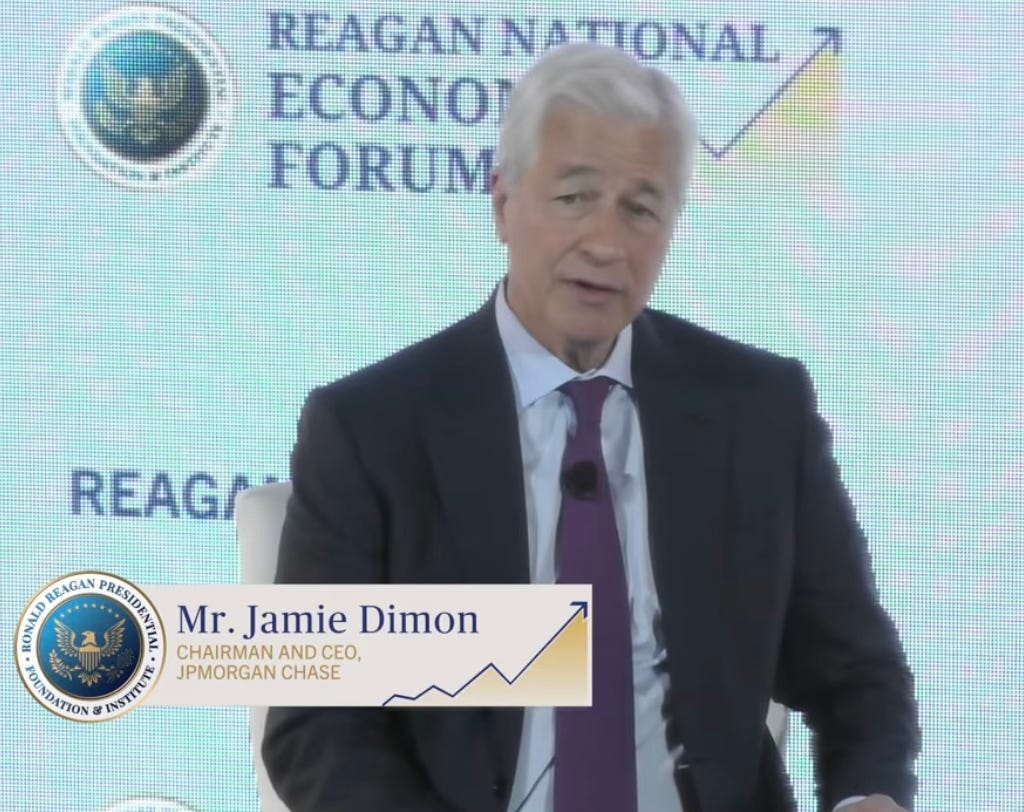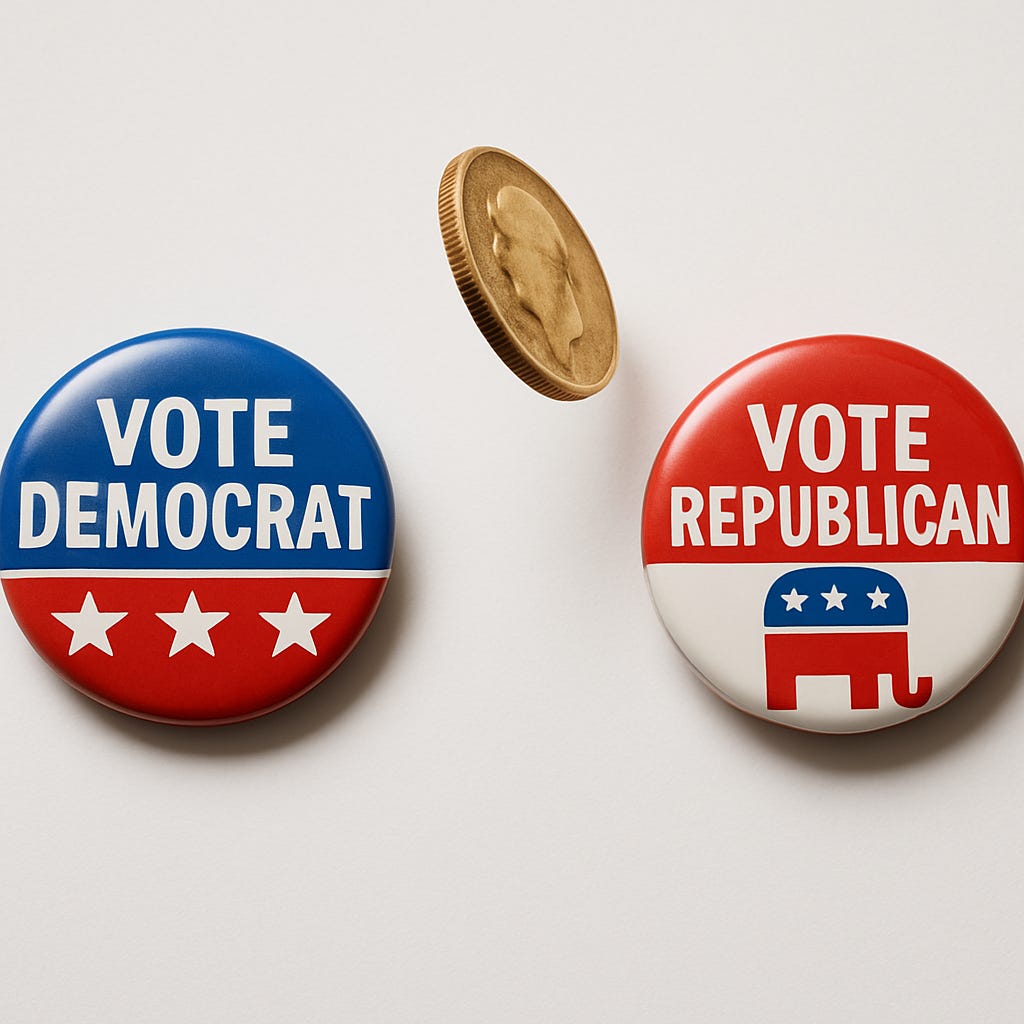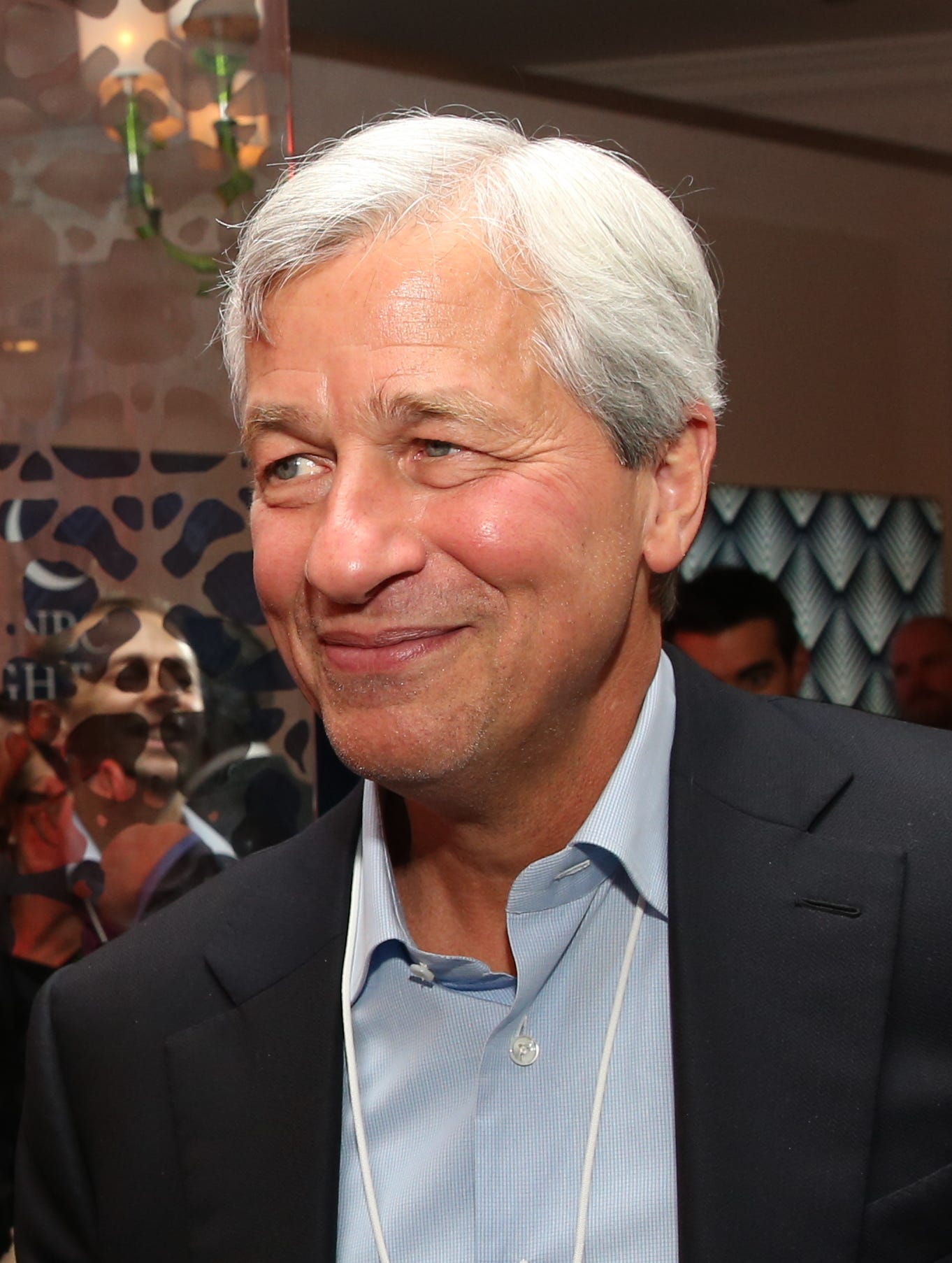Will Jamie Dimon run for President?
A man who says he won't run because he can't win is clearly thinking about it
Jamie Dimon, you’re not fooling me.
If you listen closely, the JP Morgan Chase CEO gave us all the signs Friday. He spoke at the Reagan National Economic Forum, at the Presidential Library of another former political outsider turned presidential candidate. He delivered remarks that, broadly speaking, sounded more like a presidential message test than a banking executive.
There were buzzwords: He talked about “tectonic plates shifting” in geopolitics. He painted his own vision of American strength built on traditional values. And he made the kind of joke that lands perfectly in political sound bites: "We shouldn't be stockpiling bitcoins. We should stockpile guns, bullets, tanks, planes, drones, you know, rare earths."
If that wasn’t enough, for good measure he paraphrased the Gipper. He talked about the government spending like a drunken sailor, but added that at least the drunken sailor spends his own money.
Then he was asked if he would run for public office. And his answer was many things — but it was assuredly not “no.” He answered he would only do it if he thought he could make a difference and win — and he thinks he can't win.
Just to translate for anyone not familiar with political speak 101: Anyone who talks about the conditions under which they'd run for President is clearly gaming it out.
A Presidential Run, Not a Bank One
It’s hard, but let’s try to imagine the America of 2028.
If we're facing the kind of disorder and chaos that feels increasingly possible — economic uncertainty, market turmoil, continued global instability, a fractured political system — there’s a strong case for a “steady hand.”
Dimon has a compelling case as someone who steered the ship through multiple crises. Presidents from both parties have sought his counsel. President Obama trusted him during the 2008 financial crisis. Dimon projected calm competence when markets were in a freefall.
Dimon’s recent remarks about America needing to "get our own act together" and focus on "our own values, our own capability, our own management" sound remarkably like traditional Republican messaging. (It doesn’t hurt that he repeated them in Reagan’s backyard.)
His call to "celebrate our virtues: freedom of speech, freedom of religion, freedom of enterprise, equal opportunity, family, God, country" could have been lifted from any GOP primary stump speech. (Well, except, maybe Donald Trump’s — but not one can really nail his talk track.)
With his appeal to unity and fiscal sense, it’s possible the constituency could be there for him. Americans are frustrated with a government that seems to work for everyone except them, and he seems to understand that sentiment, talking about the necessity for high quality schools and a fair shot. A successful businessman, who talks about American strength and competence, who promises to fix "our permitting, our regulations, our immigration, our taxation" — that's a message that could potentially resonate across party lines.
Why It’s Not No, But Also Not Yes
Here's the brutal political reality: In the current scenario you have to win a party primary to stand a chance nationwide. And that is an uphill battle for any outsider, maybe particularly for an outsider like Dimon who sounds like a Republican but has also said he was a Democrat in heart.
Even for party players, primaries can be tough. As I learned with Barack Obama in 2007 and 2008 we had to build a massive grassroots movement to motivate a previously unmotivated primary voter to defeat the more established Hillary Clinton.
An outsider campaign did work for Donald Trump in 2016 in the Republican primary. But since then he’s reshaped the GOP base with a populist appeal. So much so it might be difficult to envision the man who runs the nation’s largest bank system trying to win over voters who for years have been told the system is rigged against them.
For its part, the Democratic Party has more safeguards against outsider takeovers than the Republicans did in 2016. And I don’t see a scenario in which the Democratic party changes that. Rising stars like Wes Moore — who was just in South Carolina building relationships — represent a kind of traditional yet outside-the-box Democrat who could emerge.
And based on rhetoric alone, I’m not certain Dimon would have the constituency broadly in the current Democratic base. Just as Michael Bloomberg — a well-funded Democrat-turned-Republican-turned-Democrat who poured millions into a Presidential race in 2020 only to lose (both in the debate to Elizabeth Warren and in the contest to Joe Biden) — he could spend a lot of money in a primary only to lose.
The Elusive Third Way
Which brings us to the Aaron Sorkin-esque, Hollywood-style fantasy: The independent run.
If Dimon started planning now, could he finally be the one? The candidate to make a serious third-party bid work? Dimon would have the financial resources, establishment credibility, and potentially the moment — if Americans are truly exhausted by the binary choice between parties they increasingly distrust. With both parties creeping toward the extremes, there could be a moment for a middle ground candidate.
In a scenario like this, both the Democratic candidate and the Republican candidate are deeply polarizing. A MAGA flag bearer without President Trump’s charisma. A populist Democrat with little appeal to more centrist voters. A large swath of voters in the middle, eager for someone who can make things work.
This would be Dimon’s third way — but even in that scenario he would need to start thinking like a winner — instead of projecting like he’s afraid to lose. (Though that fear is well-founded: We’re just a few years removed from watching longtime Starbucks CEO Howard Schultz expensively assemble a campaign team, spend millions of his own money, and then ultimately opting out.)
Presidential campaigns aren't built on hedge fund logic — optimizing every bet for upside, and only taking the ones you think will pay out. They’re built on the audacity to believe you should be the most powerful person in the world. And that requires you to ignore many obvious obstacles and blinking yellow lights.
When President Obama ran in 2008, he did so as a junior senator, a little more than halfway through his first-term. He ran against one of the most famous last names in the Democratic party — asking millions of Americans to have their own audacity, for hope.
A Bank CEO Hedging
Jamie Dimon running for president is unlikely. A leading banker taking over the country – with a population already skeptical that the government only benefits the wealthy? The trust deficit is enormous.
But it’s not impossible. And Dimon is clearly thinking about it.
People thought Donald Trump was impossible, until he built the party around himself. A party that now is run by some in his own family. The question isn't whether Dimon could win a traditional political campaign — it's whether the moment might demand something different entirely. And whether he’s willing to risk it all.
As Dimon himself said, "If America just does our things right — deregulation, permitting, education, pro-business, grow the economy, help the lower-income folks by growing the economy, fixing immigration… we'll be in great shape."
That sounds suspiciously like a platform to me.
Now the question is whether he'll have the audacity to run on it.







Not a chance. He’d never be anything but a short term curiosity if running as a Dem. He’d have to totally embrace the MAGA universe AND be anointed by Trump, (over JD), to be given any thought as a Republican candidate, and Independents would yawn as much as the Dems would.
Let’s face it, Dimon is no Ross Perot. What this illustrates though is, at least for now, there’s a void of interesting Dem candidates for ’28.